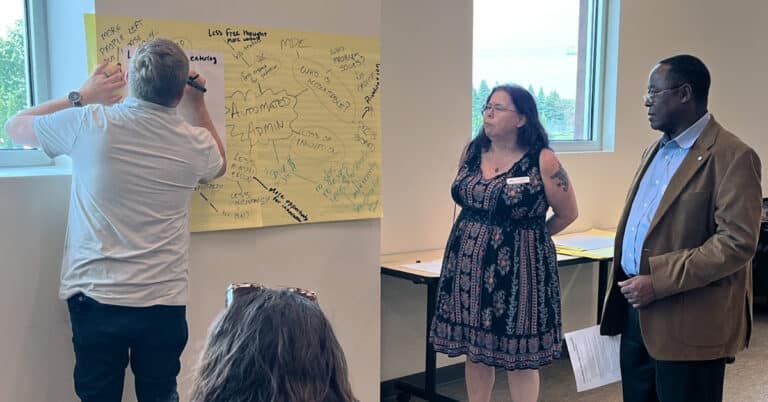This information is accurate as of the end of April 2025.
By creating the policy environments that give schools and districts the flexibility to innovate, states play a critical role in creating the conditions for student-centered education approaches that help ensure learners are college- and career-ready. To accomplish this, states must often use the legislative process.
According to the National Conference of State Legislatures, all 50 states and the District of Columbia are holding or held legislative sessions in 2025. At KnowledgeWorks, we track the introduction and enactment of bills that support personalized and competency-based learning policy environments. This year, we’ve had our eyes on a few bills that would give schools and districts more flexibility to enable innovation. In Indiana and Washington state, we’ve flagged a couple meaningful bills that have passed in the 2025 legislative sessions.
Early wins show competency-based education gaining ground.
Indiana’s legislature passed S.B. 373, which includes a Mastery Based Education Pilot Program. The legislation includes definitions related to “mastery” and establishes the pilot program. The Department of Education would be responsible for selecting participants through an application process. If signed by the Governor, participating school corporations and charter schools could request flexibility from certain statutes and regulations, including those related to instructional time. Access to expanded flexibility as it relates to instructional time and other areas of statute and regulation outlined in the bill may enable schools and districts to try new innovative approaches to teaching and learning with the goal of improving student performance and outcomes.
In Washington, S.B. 5189 passed the legislature and if signed by the Governor would define “competency-based education” along with other key terms and direct the Office of the Superintendent of Public Instruction (OSPI) to adopt rules authorizing full-time enrollment funding for students in qualifying competency-based education programs. It would also require OSPI to update the standardized high school transcript and directs the state board of education to recommend a format for a competency-based education transcript that can be part of, or an alternative to, the standardized high school transcript. If signed, this new law would enable competency-based education programs to continue without the risk of two common challenges: reductions in funding and challenges with transcripts.
While some states have already adjourned, Massachusetts, Minnesota, Nevada and North Carolina are still in session and have the opportunity to pass legislation that would support personalized, competency-based learning in their states. As these states approach their final days in session, we’re keeping an eye on whether these bills or final catch all bills with this content make it across the finish line.
Career exploration and work-based learning
Four bills in Minnesota could change the education policy landscape by creating more flexibility around student learning and enable easier adoption of some student-centered learning models. Companion bills H.F. 1607/S.F. 2250 would expand the definition of instructional time to include educational experiences for high school students that occur outside of the regular school day and week so long as they are supervised by a certified teacher and lead to students earning credit. This update to instructional time policy would permit students to engage in personalized learning opportunities like career exploration and work-based learning opportunities that take place outside of the classroom or the school day. H.F. 6 and companion bill S.F. 771 would, among other things, specifically name project-based learning and work-based learning as strategies to strengthen career and college readiness. It would also create the Office of Achievement and Innovation within the Minnesota Department of Education to help districts and schools research and implement innovative practices to promote academic achievement in various academic subjects including career readiness. And of final note, the bill would also update the Innovation Zones Program to include flexibilities related to assessment and accountability, allowing participating districts and schools to evaluate and report on skills including “problem solving, creativity, analytical thinking, collaboration, respecting others, global understanding” and others.
In North Carolina, S.B. 579 would create a commission to explore high school redesign and would also create a competency-based education learning program. The commission would “explore and recommend changes to policies and systems governing high school and higher education that will better prepare North Carolina students for success as they transition to higher education or the workforce.” Additionally, the bill would create a small competency-based pathway for high schoolers focused on healthcare and high-tech pathways. The objective of the pathway would be to obtain an associate degree or an industry recognized credential/certification. The bill includes $2 million in funding to support this program. While the program would be limited to a single school district and community college, this program and corresponding funding would help ensure that students in the program graduate college and career ready with steps already made towards their postsecondary and workforce goals. It could also serve as a prototype for a possible expanded program in future years.
Adding flexibility to instructional time and demonstration of skills
In Massachusetts, H. 661 would support acceleration accommodations for students to help them obtain “knowledge and skills, as they may be capable, at a rate faster or at an age earlier than the typical age-average student.” The bill specifically names that all students should be evaluated for acceleration accommodations and that students participating in acceleration programs should have an acceleration plan that includes academic and social-emotional supports. The bill includes several acceleration strategies that may be used, including credit by examination or prior experience and competency/mastery-based learning and advancement. If enacted, this bill would move Massachusetts toward a more student-centered approach to learning that recognizes that learning paces differ between students. A key tenet of personalized, competency-based learning is that students progress in the curriculum when they are ready, rather than at a standardized or class pace. This means that policy should both permit acceleration as well as not punishing students who need more time to master a concept or skill.
S.B. 403 and A.B. 24 in Nevada would enable easier adoption of competency-based education practices in the state. S.B. 403 would address instructional time under competency-based learning environments by allowing the department to implement alternatives to the Carnegie Unit or enabling the use of Carnegie Units to “flexibly coexist with the system of instruction used in competency-based learning.” S.B. 403 also includes an appropriation of $2.250 million for grants to assist school districts participating in the competency-based education pilot program. The legislature is also considering A.B. 24 which would give the department the authority to approve programs of competency-based education across the state. Districts operating an approved program would receive additional flexibility around instructional time. Both bills would remove competency-based education implementation roadblocks by creating a policy environment that allows these educational practices to coexist alongside traditional learning practices and corresponding structure.







